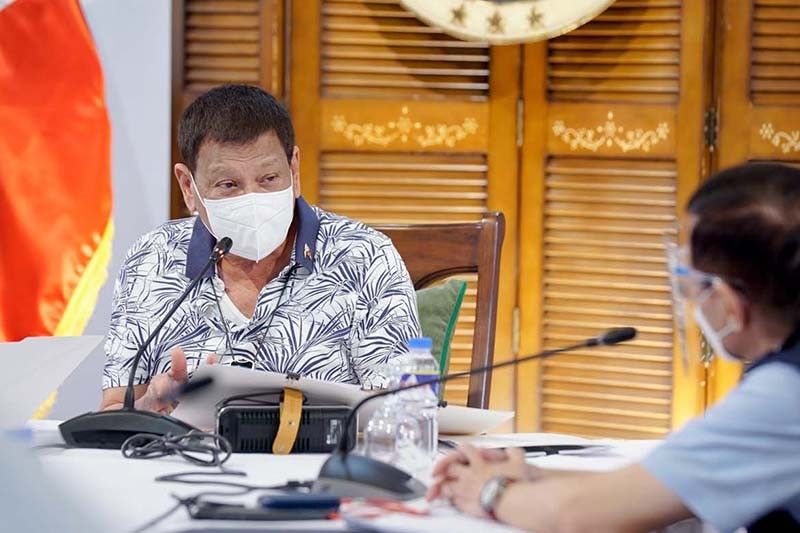Duterte says a COVID-19 vaccine may be available by September. Will it be safe and effective?

MANILA, Philippines (First published Aug. 12, 9:56 p.m.) — For President Rodrigo Duterte, the country’s hope of returning to normal rests on the development and distribution of a coronavirus vaccine.
In his addresses, Duterte has repeatedly asked Filipinos to endure coronavirus restrictions as he pinned the nation's hopes on a vaccine that would help end the pandemic.
In a speech late Monday, Duterte accepted Russia’s offer of clinical trials of a coronavirus vaccine and volunteered to get injected as a gesture of gratitude and trust. The president earlier asked China to give the Philippines priority access to coronavirus vaccines it is developing.
Duterte also projected that vaccines will be distributed worldwide by September or October.
“Hintay na lang kayo. Kaunti na lang talaga (You just wait a little longer). By December, sabi ko, in the fullness of God’s time we will have hopefully, a COVID-free December and we can enjoy this Christmas season,” Duterte said.
“Maghintay lang kayo, nandiyan na. Ang sinabi ko sa inyo noon, 'vaccine, vaccine, vaccine'. Ngayon ang vaccine nandito na,” he added. (You just wait, it's there. I was telling you before 'vaccine, vaccine, vaccine.' Now the vaccine is here)
But as scientists race to produce COVID-19 vaccines at unprecedented speed, Dr. Lulu Bravo, executive director of the Philippine Foundation for Vaccination, advised caution.
“Let’s listen to the vaccine experts internationally and locally PLEASE! Otherwise, these are speculations, wishful thinking and even miraculous predictions!” Bravo told Philstar.com in a text message.
“Vaccines may be available but these would be questionable with regards to its safety, efficacy, effectiveness and impact,” she added.
In an interview on Now You Know's "Viewpoint" in August, Rep. Janette Garin (Iloilo), a former health secretary and who is a vaccinologist, said vaccines take time to develop and manufacture.
"Maybe the earliest would probably be six months or eight months (for development)," she said then.
She added that under the Universal Health Care Act, "there is a Phase 4 stage before you can implement any vaccine or any medicine or any device for that matter."
"That will actually mean that all countries have to use it for five or 10 years before the Philippines can do it."
She said that the law will have to be amended to fast-track deployment of prospective COVID-19 vaccines.
"September, you'll be very close. December we might just have the initial results of Stage 3A. But then, that's again too tight because Stage 3A is usually where many vaccine developments fail," she said.
Dengvaxia, a dengue vaccine rolled out when Garin was health secretary, was discontinued after pharmaceutical firm Sanofi Pasteur disclosed in November 2017 that said a post-clinical trial study of Dengue Tetravalent Vaccine (Live, Attenuated) indicated an increased risk of hospitalization for dengue and "severe" dengue, "predominantly Grade I or II Dengue Hemorrhagic Fever", for patients not previously infected by the virus, which is spread through mosquito bites.
READ: How the Dengvaxia scare helped erode decades of public trust in vaccines
Russia’s vaccine
Russian President Vladimir Putin announced Tuesday that Russia has developed the first vaccine against the coronavirus. Moscow earlier said it hoped to launch mass production within weeks.
The announcement, reportedly pending clinical trials, has raised concerns about its safety and efficacy.
Russia’s pioneer vaccine candidate developed by Gamaleya Institute is listed as being in Phase 1, according to the latest draft landscape of COVID-19 vaccines published by the World Health Organization on July 28.
Phase 1 studies, according to the WHO, are “small-scale studies of which the primary focus is the determination of clinical tolerance and safety.” According to the US Food and Drug Administration, Phase 1 of clinical trials may last for “several months.”
The United Nations health agency last week urged Russia to go through the full stages of testing before a vaccine candidate is rolled out.
READ: Russia has developed 'first' coronavirus vaccine — Putin
Clinical trials
Researchers around the world are developing some 165 vaccines against the coronavirus.
Of those, 139 are still in pre-clinical evaluation, which is a prerequisite for the initiation of clinical trials.
“The primary goal of preclinical testing of a new vaccine product, or a new combination vaccine comprised of previously licensed antigen(s), or vaccines presented in new formulations or new delivery systems, should be to demonstrate that the vaccine is suitable for testing in humans,” the WHO noted.
The remaining 26 candidate vaccines are in the various phases of being tested on humans, of which six have reached Phase 3 of clinical evaluation.
Phase 2 studies, which involve up to several hundred people and are often randomized and well-controlled, aim to define the optimal dose, initial profile and safety profile of vaccine candidates,” WHO said. This may last several months up to two years.
Phase 3 studies, meanwhile, are “large-scale clinical trials designed to provide data on vaccine efficacy and safety.” The US FDA said this may last for a year up to four years and approximately 25 to 30% of drugs move to the next phase.
Vaccines in Phase 3
Among the vaccine candidates that have reached Phase 3 are those being developed by University of Oxford/AstraZeneca, China’s Sinovac, Wuhan Institute of Biological Products/Sinopharm, Beijing Institute of Biological Products/Sinopharm, Moderna/NIAID and Bio N Tech/Fosun Pharma/Pfizer.
Observational studies of the efficacy or effectiveness of vaccines are usually part of Phase 4 post-licensure studies.
The WHO earlier said COVID-19 vaccinations cannot be expected until early 2021.
Michael Ryan, WHO health emergencies program director, said Monday that finding a vaccine would not automatically spell the end for the pandemic that has so far infected 20 million people worldwide.
“We have perfectly effective polio and measles vaccines and we still struggle to eradicate or eliminate those diseases,” Ryan said.
“Having an effective vaccine is only part of the answer. You’ve got to be able to deliver that vaccine to a population that want and demand to have that vaccine,” he added.
Last month, the country joined the COVID-19 Vaccines Global Access (COVAX) facility, which aims to help ensure fair and equitable access to coronavirus vaccines. Under the COVAX facility, vaccines will be initially delivered equally to all participating countries, initially prioritizing health care workers, then expanding to cover 20% of the population.
But what should governments do while waiting for coronavirus vaccines? The WHO said they should focus on the most effective for now: testing, contact tracing, maintaining physical distance and mask wearing. — Gaea Katreena Cabico with report from Agence France-Presse
Related video:
- Latest
- Trending




























